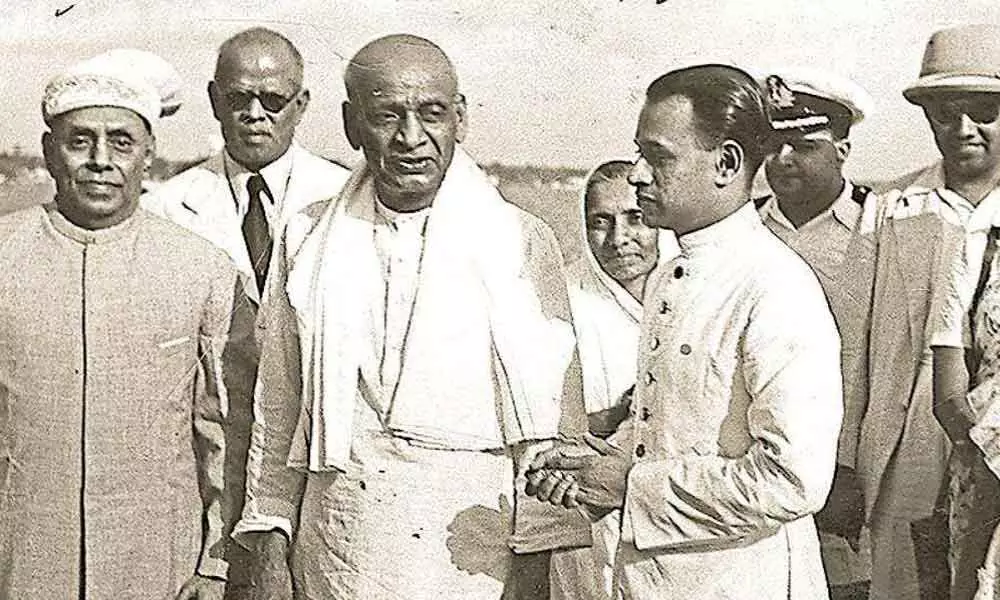Uncelebrated stalwart

‘VP Menon-The Unsung Architect of Modern India’ is the saga of a man, who plays equally pivotal role in the integration of India as does Sardar Vallabhbhai Patel
When victory is achieved in a battlefield, it is often the high-ranking officers, who are conferred with the plaudits but seldom are highlighted the supreme contributions of those who actually face the bullet at the behest of their superiors. Indubitably, no war can be won without the collective efforts of both of the segments but the sacrifices of the real fighters unfortunately often pale into insignificance. Similarly, NarayaniBasu's latest book 'VP Menon-The Unsung Architect of Modern India' is the saga of a man, who plays an equally pivotal role in the integration of India as does Sardar Vallabhbhai Patel. History has been certainly unfair in doing justice to its heroes. When it comes to the idea of independent India as a unified whole, books are plenty in number singing the glory of Sardar Patel and comparing him with a solid thread that binds the various scattered princely states of India in a single coherent unit. Though the truth is undeniable, but it is only partial. Reading this book we are astonished to know that if Patel is the binding thread; It is VPMenon (The Reforms commissioner of India during the Raj) who acts as a needle for that thread. The author who is an eminent historian sheds floods of light on the various hues of the complex personality of VP Menon. She bases most of her book on both the intensive as well as extensive historical research that has gone into the making of this deeply engaging biographical work. Digging deeper into the sepia archives and many other sources available, the readers are presented with an opportunity of meeting the maker of free India who in fact chooses to stay away from the limelight and the public glare which his comrades loved to revel in.
Staying true to its title the book profusely dwells on the colossal contributions, the chief protagonist fearlessly and wholeheartedly makes in the prodigious process of architecting a new India post-independence. The author deserves special adulation for the fact that she has been quite successful in letting Menon speak for himself through the countless archives that she manages to procure and analyse with profound meticulousness and utmost assiduousness. Understanding VP Menon through the dispassionate accounts of the biographer his persona can be pertinently compared with a Marlowean hero, who rises from the lowest rung of the strata and attains the lofty heights of success by burning mid night oil. Unlike Shakespearean heroes he does not have blue blood in his veins. Therefore, positions of power are not inherited by VP with ease; they are acquired owing to his enormous dedication to work. Dereliction to duty has never been in his profile. It is his copious intelligence and innate ability to tackle the most critical situations which make him a blue eyed of the Britishers and thereon a protégé of the iron man Sardar Patel.
Segmented into fifty-nine chapters the book makes a great favour to the world of scholarly research by highlighting Menon's often unrecognised contributions in coaxing and cajoling many of the high-headed and obstinate rulers of the princely states to sign the 'Instrument of Accession'. Like his mentor Patel, Menon too had his carrot and stick policy. Thus, if candy-floss mollycoddling would fail to deliver the goods, he did not hesitate to take recourse to fierce aggression.
The subtle style of writing is in absolute synchronisation with its equally subtle subject matter. The author maintains quite a classy and formal tone while laying bare the enigmatic and esoteric life of this great but thus far an unsung architect of India. Whether a fiction or a nonfiction unity in the expression of thought is considered a key element and it is this very unity which lends the book a unique sublimity. So intense and emotive are the descriptions that when flipping through the pages the readers feel as if they are having their exclusive rendezvous with VP Menon. In sooth, the book can be summed up as a befitting tribute to one of the towering but uncelebrated stalwarts of India.








